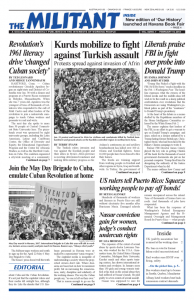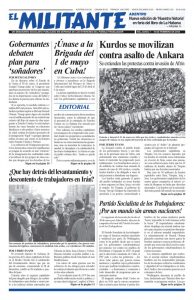Below is an excerpt from Lenin’s Final Fight, 1922-23, one of Pathfinder’s Books of the Month for February. In these speeches and writings Lenin, the central leader of the 1917 Bolshevik Revolution, waged what was to be his last political battle over whether that revolution would remain on the proletarian course that brought workers and peasants in the former czarist empire to power. The excerpt is from Dec. 31, 1922, letters to the party congress in defense of the rights of oppressed nationalities. Copyright © 2010 by Pathfinder Press. Reprinted by permission.
In my writings on the national question I have already said that an abstract presentation of the question of nationalism in general is of no use at all. A distinction must necessarily be made between the nationalism of an oppressor nation and that of an oppressed nation, the nationalism of a big nation and that of a small nation.
In respect of the second kind of nationalism we, nationals of a big nation, have nearly always been guilty, in historic practice, of an infinite number of cases of violence; furthermore, we commit violence and insult an infinite number of times without noticing it. It is sufficient to recall my Volga reminiscences of how non-Russians are treated; how the Poles are not called by any other name than Polyachishka, how the Tatar is nicknamed Prince, how the Ukrainians are always Khokhols and the Georgians and other Caucasian nationals always Kapkasians.
That is why internationalism on the part of oppressors or “great” nations, as they are called (though they are great only in their violence, only great as Derzhimordas), must consist not only in the observance of the formal equality of nations but even in an inequality, through which the oppressor nation, the great nation, would compensate for the inequality which obtains in real life. Anybody who does not understand this has not grasped the real proletarian attitude to the national question; he is still essentially petty bourgeois in his point of view and is, therefore, sure to descend to the bourgeois point of view.
What is important for the proletarian? For the proletarian it is not only important, it is absolutely essential that he should be assured that the non-Russians place the greatest possible trust in the proletarian class struggle. What is needed to ensure this? Not merely formal equality. In one way or another, by one’s attitude or by concessions, it is necessary to compensate the non-Russians for the lack of trust, for the suspicion and the insults to which the government of the “dominant” nation subjected them in the past.
I think it is unnecessary to explain this to Bolsheviks, to Communists, in greater detail. And I think that in the present instance, as far as the Georgian nation is concerned, we have a typical case in which a genuinely proletarian attitude makes profound caution, thoughtfulness, and a readiness to compromise a matter of necessity for us. The Georgian who is disdainful of this aspect of the question, or who carelessly flings about accusations of “nationalist socialism” … violates, in substance, the interests of proletarian class solidarity, for nothing holds up the development and strengthening of proletarian class solidarity so much as national injustice. “Offended” nationals are not sensitive to anything so much as to the feeling of equality and the violation of this equality, if only through negligence or jest to the violation of that equality by their proletarian comrades. That is why in this case it is better to overdo rather than underdo the concessions and leniency towards the national minorities. That is why, in this case, the fundamental interest of proletarian solidarity and consequently of the proletarian class struggle requires that we never adopt a formal attitude to the national question, but always take into account the specific attitude of the proletarian of the oppressed (or small) nation towards the oppressor (or great) nation. …
[T]he strictest rules must be introduced on the use of the national language in the non-Russian republics of our union, and these rules must be checked with special care. There is no doubt that our apparatus being what it is, there is bound to be, on the pretext of unity in the railway service, unity in the fiscal service and so on, a mass of truly Russian abuses. Special ingenuity is necessary for the struggle against these abuses, not to mention special sincerity on the part of those who undertake this struggle. A detailed code will be required and only the nationals living in the republic in question can draw it up at all successfully. Moreover we must not in any way reject in advance that as a result of all this work we may well take a step backward at our next Congress of Soviets, namely, retaining the union of Soviet socialist republics only for military and diplomatic affairs and in all other respects restoring full independence to the individual people’s commissariats.
It must be borne in mind that the decentralization of the people’s commissariats and the lack of coordination in their work as far as Moscow and other centers are concerned can be compensated sufficiently by party authority if it is exercised with sufficient prudence and impartiality. The harm that can result to our state from a lack of unification between the national apparatuses and the Russian apparatus is infinitely less than that which will be done not only to us but to the whole International and to the hundreds of millions of the peoples of Asia, which are destined to follow us onto the stage of history in the near future.
It would be unpardonable opportunism if, on the eve of the debut of the East, just as it is awakening, we undermined our prestige with its peoples, even if only by the slightest crudity or injustice towards our own non-Russian nationalities. The need to rally against the imperialists of the West, who are defending the capitalist world, is one thing. There can be no doubt about that and it would be superfluous for me to speak about my unconditional approval of it. It is another thing when we ourselves lapse, even if only in trifles, into imperialist attitudes towards oppressed nationalities, thus undermining all our principled sincerity, all our principled defense of the struggle against imperialism. But the morrow of world history will be a day when the awakening peoples oppressed by imperialism are finally aroused and the decisive long and hard struggle for their liberation begins.

